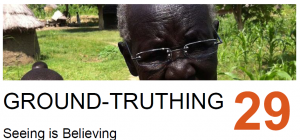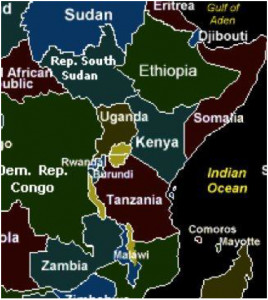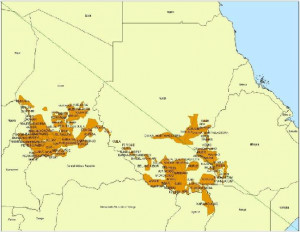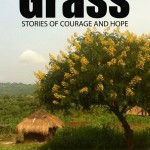
A word from Curt
Truth. It’s knowing the facts. Seeing for yourself. It’s the theme of this story.
You’ll meet Oscar.
And his dad.
And a new word. Ground truthing.
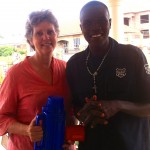
We’re posting chapters from our new ebook, Trampled Grass, daily.
You can download a copy in four ways:
Read sample chapters or purchase at Amazon.
- Read sample chapters or purchase at Smashwords.
- You can download a free PDF at creekbank.netby signing up for our Story Letter.
- Download the Snippet App for easy reading on your tablet or phone.
Receive our monthly Story Letter, here.
Do you wish to be notified of future blog posts? Click here to subscribe to The Creek Blog.
You tell Mzungu to come up here (to Nebbi) so I can see him with my naked eye.”
–Message from the father of our guard, Oscar.
Oscar’s dad had heard about me but wished to see me face-to-face. That’s what Ground-Truthing is.
This means seeing it first hand; not taking anyone else’s word for it.
In the work of people-group research/anthropology, it’s called “Ground Truthing”—putting your boots on the ground to see for yourself: where people live, how they live and what they believe.
Maps cannot replace that.
Wikipedia can’t touch it.
Word of mouth is good.
But nothing is quite like going “barefoot.”
Going there and putting your bare feet, or in our case, boots on the ground. Getting in among the people and seeing, feeling and tasting.
They’ve opened a new mall in our town of Entebbe. It’s got a Nakamatt (Africa’s version of Wal-Mart). They’ve posted a sign that they’ll soon have a KFC.
Rumors have swirled that the mall will eventually feature a multi-screen cinema. That’s a big deal. It’s been over a year since I’ve seen a movie in a theater. Watching a movie on a Kindle Fire is different from the big screen.
I have tromped through the partially completed three-story mall looking for the cinema. I’ve gotten directions on its location:
“It’ll be on the ground floor.”
“First floor for sure.” (Warning: it is actually the second floor. Those Brits mess up everything over here.)
“Past the corridor on floor two.”
No sign of any room that even remotely resembled a cinema.
“Oh, it’ll open by the end of April.”
“Summer at the latest.”
I began to doubt the African grapevine.
There doesn’t seem to be a cinema being built.
My hopes plummeted.
At least we have Amazon Prime.
Two days ago, I made another survey of the mall.
After two false leads, a third person said, “It’s in the hall behind the Yogurt stand in the Food Court.”
And there it was—two rooms with bare concrete, but clearly what will eventually be a cinema.
I believe I even smelled popcorn.
I now knew for sure. I’d seen it with my own naked eye. I didn’t have to take anyone else’s word for it.
“When will y’all be opening?”
“Soon. Real soon.”
Beware of these Africanisms: “Real soon” and “It’s not far.
The small country of Uganda is in the heart of Africa. Its larger neighbor South Sudan is north.
That brings me back to our work.
Our job and calling is connecting or engaging unreached people groups with believers in both Africa and America.
It’s about relationships. But isn’t everything?
Our Chadan Region:
Hundreds of the least reached groups are located in South Sudan and southern Chad.
Our area is called Chadan. It includes South Sudan and the southern half of Chad.
Both regions have difficult conditions as well as hundreds of thousands of unreached by the life-changing Gospel of Jesus.
Our focus has been on South Sudan, the world’s newest country. During 2013 our team moved in and out of the country.
We were ground-truthing.
You could call it ground trotting.
Because many of our SS people groups live along the borders, we’ve also worked in northern Kenya and especially northern Uganda.
The end of 2013 brought an end to the fragile peace that was in South Sudan. Suddenly entering most of the country became impossible.
Most plans for 2014—going to places like Malakal, Bentui, and Juba—were shattered. The situation deteriorated in the first quarter of 2014. A ceasefire and peace all seem far-fetched.
Our team is currently seeking God’s direction on focus and strategy. Here are our big questions:
- How do we best do Engagement of the Unreached with the situation in South Sudan?
- The two main parts of Engagement are Training (Discipling Leaders) and
Research (Ground-Truthing) How do we go about those in the current situation?
- Thousands of “our people” (the unreached of South Sudan) have fled into neighboring countries. How do we Engage in the Refugee Camps of Uganda, Kenya, and Ethiopia?
- Are the closed doors within South Sudan a call to work in southern Chad? Or the refugee camps?
- As things slowly improve in South Sudan, when/how/where should we return?
- As the predicted famine unfolds, how do we respond? These are all big questions that require God-sized answers
We implore you to pray for our Chadan leadership.
What do we need to see? Do?
Where do we need to put our naked eyes?

Chadan Engagement Team
exists to reach the least reached in South Sudan and southern Chad.
On one of my trips #Up Country, we stopped in Nebbi Town and met Oscar’s father.
He later called his son, “Now I have seen your Mzungu with my naked eye and
I know he is real.
I know he truly is your friend.”
That’s ground-truthing at its best.
Question for your comment: what’s your favorite “seeing is believing” story?
- If you enjoyed this story, you can receive notification when new The Creek Blog posts are published.
- We’d be so honored to have you on our monthly Story Letter email here.
- Follow us on:
- Curt’s Facebook
- Enjoy our Boards on Pinterest
- Twitter: @curtiles #UpCountry #goChadan
- The Creekbank Amazon Page
We always enjoy hearing from our readers.
Contact Us!
We love to hear from readers at CreekBank Stories!
For Snail Mail, mail to:Creekbank Stories
PO Box 6060
Alexandria, LA 71307
 Creekbank Stories Curt Iles, Storyteller
Creekbank Stories Curt Iles, Storyteller
